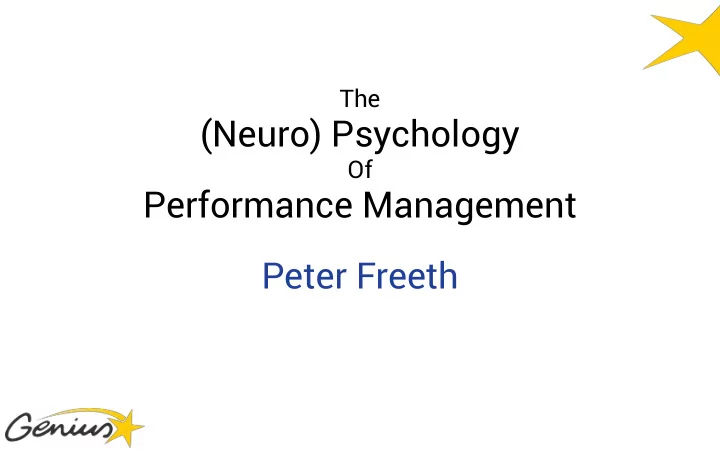

The (Neuro) Psychology Of Performance Management Peter Freeth
Performance management is the activity and set of processes that aim to maintain and improve employee performance in line with an organisation's objectives. CIPD Factsheet
A Brief History 221-265AD Emperors of the Wei Dynasty rated the performance of the offcial family members The philosopher Sin Yu... “The Imperial Rater of Nine Grades seldom rates men according to their merits but always according to his liking.”
A Brief History Late 1920s Western Electric's Hawthorne factory, Elton Mayo Any change increased performance “It was the fact that someone was actually concerned about their workplace” ‘What gets measured gets done’
A Brief History 1950s Behaviourism Benchmarking Time and Motion Esso created the 360º review (T group)
A Brief History 1980s GE CEO Jack Welch “rank-and-yank” Managers evaluate all employees yearly 3 2 1
A Brief History 1980s GE CEO Jack Welch “rank-and-yank” Managers evaluate all employees yearly 3 2 1
A Brief History 1980s Appraisals Performance Related Pay Piece work for all How to evaluate what you can’t count?
A Brief History Today Organisations moving away from the annual review Ongoing performance management Short term goal, review, reward
Psychology of Performance Nothing has changed… really We are biased We are goal oriented We focus on reward Our brains are connecting machines
Building Blocks Genome The instructions to build you Phenome How those instructions are physically interpreted Connectome Your life’s experiences built on that physical structure
Scientists have electronically inserted Scientists have put memories into the brains a worm’s brain into of mice. a robot. “The connectome of the worm was mapped and implemented as a software system and the behaviours emerge.”
A Matter of Time
Conditioning Stimulus – Response Sensory inputs spontaneously connect to motor outputs If the timing is right Spike Timing Dependent Plasticity 1973 - 1998
Servo Control Mechanism The brain and nervous system are a servomechanism An autonomous, goal seeking system Capable of great accuracy using crude components Outcome Are we there yet? Feedback Motors
Decision Perception Action Effect
Learning K o l b , 1 9 8 5
Boston Dynamics
What’s Important? The ‘quality’ of feedback is not important Warmer / Colder The most critical factors are: Time delay between decision and feedback Autonomy of the decision maker
In Other Words Don’t tell people what to do Tell them the deviation from course They will fgure out the right adjustment The closer they get, the better their adjustments They will become more accurate over time
Reward People will do more of what you reward them for Forms of reward:
Reward is Ineffective Extrinsic rewards Lepper 1973 Herzberg 1987
The Mind is a Simulator The Simulation Theory of Mind Reading 1986
Mind Reading Mirror Neurons Mi r r o r Gallese and Goldman 1985 N e u r o n s
Innate Fairness Frans de Waal Morality and ethics in animals Innate sense of fairness Crows, Elephants, Dogs, Primates Neuroscience of empathy
Frans de Waal (TED)
Implications of Equity Same task = same reward Reward relative to individual agreement? Bias Gender pay gap!
Motivation What about motivation?
Dual Realities
Planning for Inaction “ I ’ m g o i n g t o t h e g y m l a t e r ” “ I ’ m s t a r t i n g my d i e t o n Mo n d a y ” “ I ’ m l o o k i n g f o r a n e w j o b n e x t y e a r ”
Motivation Motivation creates conflict Desire Reality
Motivation is the absence of Action
Goals Present a monthly update to the board ? SMART Sales target £1,000,000 Complete a report by Friday Solutions
Setting Objectives Giving solutions prevents autonomous goal seeking Don’t give people objectives to achieve Give them problems to solve Let them fgure out the solution Reward learning and autonomy, not success
Performance Management Rules Express objectives as problems , not solutions Create the ‘ Desire map’ Simple , fast feedback Warmer / Colder Difference - what happened v what was expected Fair reward Reward decisions that drive behaviours instead of results
Performance Management Rules Simple , fast feedback We worry about employee engagement That’s not the problem We need to worry about manager engagement
Questions ?
Important Questions How will you get there? Are we there yet?
www.geniuslearning.co.uk
Recommend
More recommend